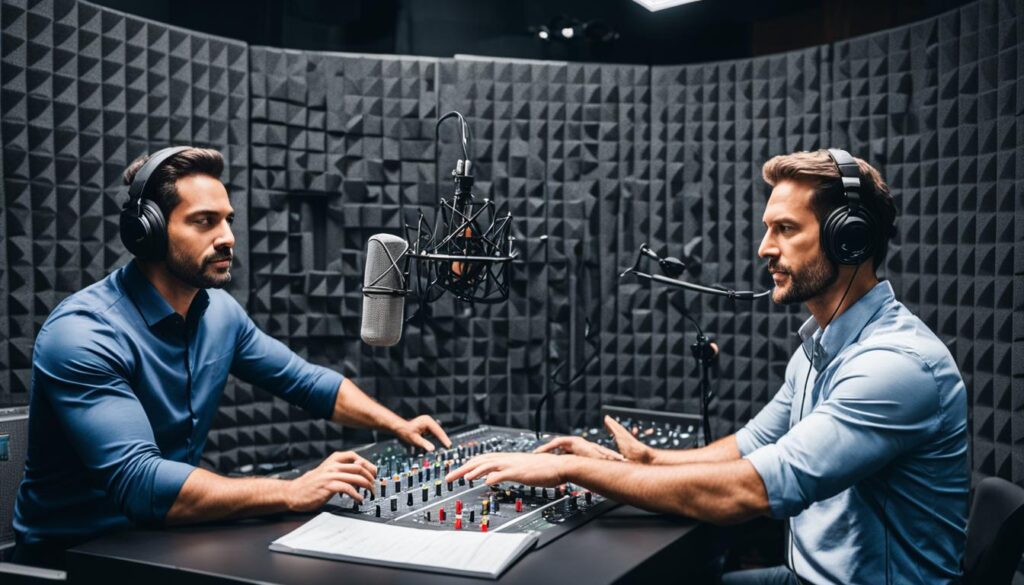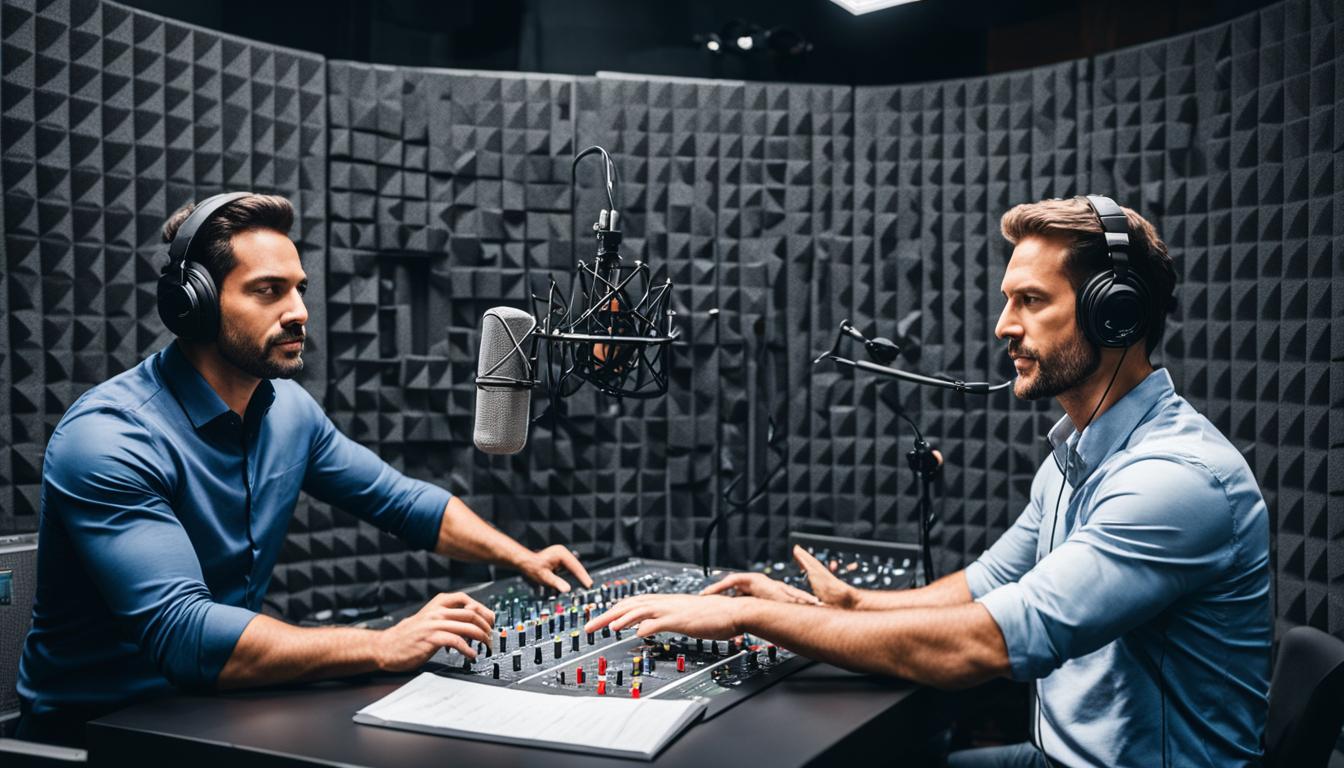As a professional audiobook narrator, I understand the importance of collaboration within the industry. Working alongside other professionals such as authors, publishers, directors, sound engineers, and producers is crucial in creating high-quality audiobooks that keep audiences engaged and entertained.
Audiobook narrator industry collaborations not only enhance the final product, but they also create opportunities for skill development and personal growth. Collaborating with others provides the chance to learn and evolve as a narrator while contributing to the success of a project.

Key Takeaways:
- Collaboration is essential in the audiobook narration industry for producing quality work.
- Working with other professionals such as authors, publishers, directors, sound engineers, and producers helps enhance the final product.
- Collaboration also provides opportunities for skill development and growth.
- Audiobook narrators can learn and evolve from working with other industry professionals.
- A successful collaboration contributes to the success of the project and benefits everyone involved.
The Role of Audiobook Narrators in Collaborative Productions
Collaborative productions in audiobook narration are a vital part of creating captivating audio experiences. As a narrator, my role in these collaborations is to work closely with authors, directors, and sound engineers, bringing stories to life through my unique vocal performances.
In essence, I am the conduit between the written text and the audience’s ears. Together with the author, we create a vision of how the story should sound and the emotions it should evoke. This is where my vocal performance comes in, as I use inflection, accent, and tone to bring characters to life and draw listeners into the story’s world.
As a narrator, I rely heavily on my colleagues in the industry. The director provides guidance, ensuring consistency in the narration and that the author’s vision is being realised. The sound engineers and producers have a crucial role to play in ensuring the quality of the final product, including editing and mastering the audio track. By working together, we can create an immersive listening experience that keeps the audience engaged from start to finish.
Whether it’s through emoting, pacing or tone of voice, my role in collaborative audiobook productions is to bring a personal touch to the story. This may involve incorporating different vocal styles to differentiate between characters or using specific sounds or music to set the mood for a particular scene. Every audiobook is unique, and that’s what I love about this industry.
Ultimately, the success of a collaborative audiobook production relies on teamwork and communication between all stakeholders. By combining our individual skills and talents, we can create audio masterpieces that keep listeners coming back for more.
Finding the Right Voice: Collaborating with Authors and Publishers
As an audiobook narrator, I know how important it is to collaborate with authors and publishers to find the right voice for a book. It’s not just about having a pleasant voice but also about ensuring that the narrator’s tone, style, and pacing match the story’s message and characters.
Collaboration between narrators, authors, and publishers involves several discussions and considerations. First, the narrator must understand the book’s genre, tone, and intended audience. The author’s input is critical in providing insights into the characters and their personality. Here, we work together to create a unique interpretation of the story that connects with the audience on another level.
The selection process is equally important, and we take the time to audition different narrators to find the voice that fits the story best. Feedback from publishers and listeners is often incorporated into the decision-making process to ensure we provide the best possible narration.
Ultimately, successful collaborations between narrators, authors, and publishers enhance the audiobook’s quality, appeal, and success.
“A narrator can bring so much to a book, adding another layer of emotion, energy, and personality. Collaboration is the key to finding the right voice for a story that resonates with listeners.”
Working with Sound Engineers and Producers in Audiobook Narration
Collaborating with sound engineers and producers is a critical aspect of creating high-quality audiobooks. Sound engineers are responsible for technical aspects like recording, mixing, and mastering, while producers oversee the entire production process, ensuring the audiobook meets quality standards.
As an audiobook narrator, working with sound engineers and producers helps to shape the final product. Collaborating with these professionals allows us to incorporate sound effects and music that enhance the listening experience, making the audiobook more engaging for the listener.
During the recording process, sound engineers help us to achieve the desired vocal quality. They provide guidance on microphone placement, recording levels, and background noise reduction. This ensures that the final product is clean and free of any unwanted noise or distractions.
Producers help to ensure that the audiobook accurately captures the intended tone and style of the story. They work alongside the narrator, author, and sound engineer, overseeing the entire production process from start to finish.
By collaborating with sound engineers and producers, we can create audiobooks that stand out in the industry. Working together allows us to take listeners on an immersive journey, making them feel like they are part of the story.
Collaborating Across Different Genres and Styles in Audiobooks
As an audiobook narrator, one of the most exciting aspects of collaboration is the opportunity to work across a wide range of genres and styles. From classic literature to contemporary thrillers, my work has exposed me to different forms of storytelling and challenged me to adapt my narration style accordingly.
The key to collaborating across genres and styles is versatility and adaptability. Each book presents unique challenges and requires a distinct approach to narration. For instance, non-fiction books often require a more straightforward and informative tone, while fiction books may demand more emphasis on characters and dialogue to bring out the essence of the story.
Genres such as science fiction or fantasy may necessitate creating distinctive voices or sounds for different characters or creatures. Narrating a memoir or biography often involves studying and conveying the voice and personality of the author as accurately as possible.
Ultimately, collaborating across genres and styles is an opportunity to expand my skills and understanding as an audiobook narrator. The challenge keeps things fresh and exciting, and I constantly learn and grow with each new project.
“Collaborating across different genres is an exciting challenge that pushes me to explore different styles and narration techniques.”
Successful Collaborations: Examples and Tips from Audiobook Narrators
Through my experience working in the audiobook narration industry, I have learned that collaboration is key to creating a successful audiobook. To help others navigate this collaborative process, I have gathered some examples and tips from experienced narrators.
One example of a successful collaboration I have witnessed was between a narrator and an author who had a very particular vision for how they wanted the audiobook to sound. The narrator took on board the author’s feedback and suggestions, and together they crafted a truly unique and captivating listening experience.
Another tip that I have found to be helpful when collaborating is to establish open and clear lines of communication with all parties involved. This means being receptive to feedback and criticism, and also being willing to speak up when necessary to express your own ideas or concerns.
When collaborating with sound engineers and producers, it’s important to be familiar with the technical aspects of audio production. This makes it easier to communicate your ideas and understand the input of others, which ultimately leads to a smoother and more successful collaboration.
Finally, one of the most important aspects of collaboration is being respectful of each other’s ideas and opinions. By creating a supportive and collaborative environment, you can work together to create an audiobook that truly shines.
In conclusion, successful collaborations in audiobook narration take hard work and dedication. By following these tips and learning from examples of successful collaborations, you too can create a captivating audio experience for listeners.
